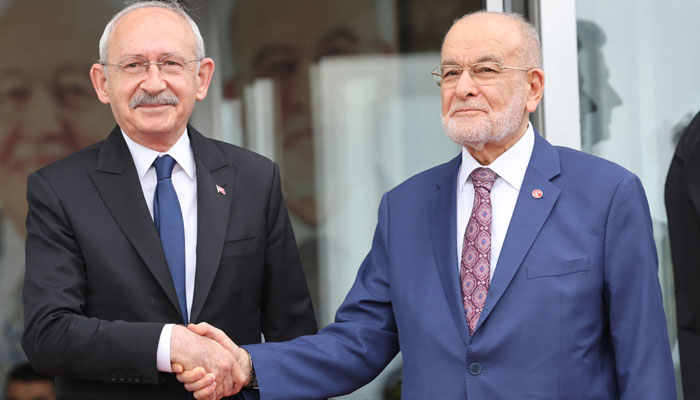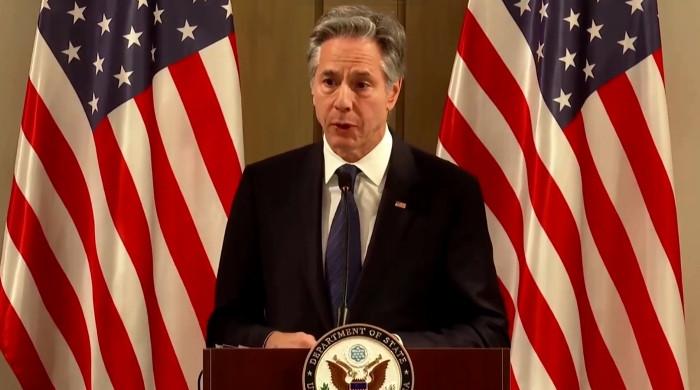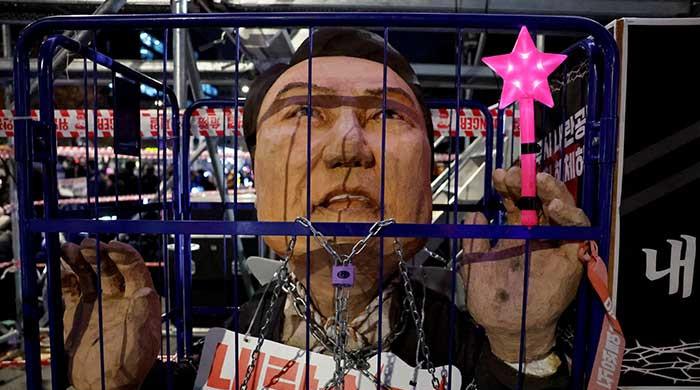Turkey's fractured opposition unites against Erdogan
President faces fight of his political life in what many view as Turkey's most consequential election
March 07, 2023

ANKARA: Turkey's bickering opposition leaders ended months of fierce debate Monday and agreed to name the head of the main secular party as their joint candidate against President Recep Tayyip Erdogan in May 14 polls.
A last-ditch deal aimed at averting a split of the opposition vote will see CHP chief Kemal Kilicdaroglu name the other five opposition leaders as vice presidents should he end Erdogan's two-decade rule.
"We would have been eliminated had we split up," Kilicdaroglu told huge crowds of cheering supporters after emerging from hours of tense talks.
Erdogan faces the fight of his political life in what many view as Turkey's most consequential election since its birth as a post-Ottoman republic 100 years ago.
The 68-year-old leader needs to overcome the twin hurdles of an economic crisis and that aftermath of a devastating earthquake as he seeks to extend his Islamic style of the rule until 2028.
Opinion polls point to a tight race that remains far too close to call.
But Erdogan's task had appeared to become a little easier when one of the main leaders of the six-party opposition alliance walked out of the talks on Friday.
Meral Aksener has argued that Kilicdaroglu - a soft-spoken leftist from Turkey's long-marginalised Alevi community - lacked the public appeal to defeat Erdogan in the presidential ballot.
She has instead urged the popular CHP mayors of either Istanbul or Ankara to step into the race.
The two met Aksener on Monday in an attempt to bring her nationalist Iyi Party back into the opposition fold.
"Our nation cannot tolerate a split," Ankara mayor Mansur Yavas told reporters after the meeting.
Istanbul mayor Ekrem Imamoglu said preserving the alliance was "especially important in the difficult days that Turkey is going through after the earthquake".
Economic hopes
The opposition last united in an effort to unseat Erdogan's allies in municipal elections held in 2019.
Their ability to regain control of Turkey's two main cities shattered Erdogan's aura of invincibility and set the stage for the possible return to power by the party of the secular state's revered founder Mustafa Kemal Ataturk.
But Kilicdaroglu argued that both Yavas and Imamoglu should stay on as mayors to avoid the threat of handing back control of either city to Erdogan's Islamic-rooted party.
A separate text agreed upon by the six leaders left open the option of promoting the two mayors to the vice president once a transition to a new system of power is complete.
Analysts viewed the opposition's failure to put aside their differences just two months before the vote as one of the main factors working in Erdogan's favour.
Erdogan's public approval plunged after he unleashed an unusual economic experiment in late 2021 that tried to fight inflation by drastically cutting interest rates.
A resulting currency crisis erased people's savings and pushed the annual inflation rate to an eye-watering 85 per cent.
Turkish stocks and Eurobonds both rallied on rising investor hopes that the joint candidate will be able to beat Erdogan and restore economic orthodoxy after years of tumult.
Kilicdaroglu has promised to restore the central bank's full independence - and freedom to raise interest rates - should he win.
Erdogan seeks forgiveness
Erdogan's widely praised handling of Russia's invasion of Ukraine helped reverse the slide in his approval rating and set him up with a chance to secure a come-from-behind win.
But a catastrophic earthquake last month that killed more than 46,000 people in Turkey and nearly 6,000 in Syria threatened to doom Erdogan's entire political career.
Erdogan conceded that his government had been slow to respond in the first critical days of the crisis and asked voters for forgiveness for some rescue delays.
He also brushed aside rumours that he would try to delay the May vote to a more politically favourable date.
"We are not hiding behind excuses," he said last week.
"We will not rest until normal life resumes in the quake zone," he told a cabinet meeting on Monday.











